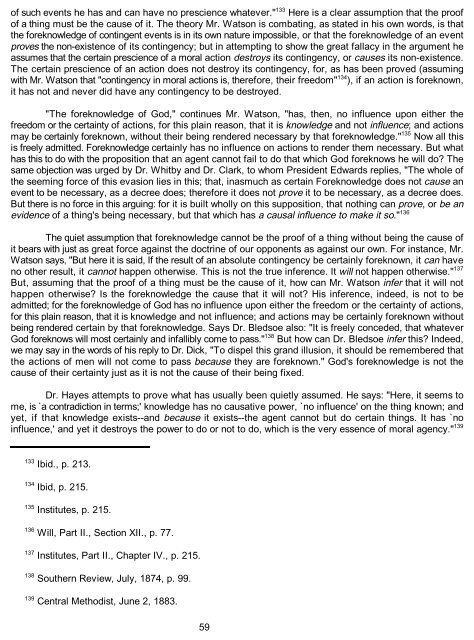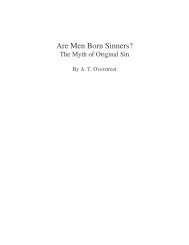Foreknowledge by Joel Hayes - Library of Theology
Foreknowledge by Joel Hayes - Library of Theology
Foreknowledge by Joel Hayes - Library of Theology
Create successful ePaper yourself
Turn your PDF publications into a flip-book with our unique Google optimized e-Paper software.
133<br />
<strong>of</strong> such events he has and can have no prescience whatever." Here is a clear assumption that the pro<strong>of</strong><br />
<strong>of</strong> a thing must be the cause <strong>of</strong> it. The theory Mr. Watson is combating, as stated in his own words, is that<br />
the foreknowledge <strong>of</strong> contingent events is in its own nature impossible, or that the foreknowledge <strong>of</strong> an event<br />
proves the non-existence <strong>of</strong> its contingency; but in attempting to show the great fallacy in the argument he<br />
assumes that the certain prescience <strong>of</strong> a moral action destroys its contingency, or causes its non-existence.<br />
The certain prescience <strong>of</strong> an action does not destroy its contingency, for, as has been proved (assuming<br />
134<br />
with Mr. Watson that "contingency in moral actions is, therefore, their freedom" ), if an action is foreknown,<br />
it has not and never did have any contingency to be destroyed.<br />
"The foreknowledge <strong>of</strong> God," continues Mr. Watson, "has, then, no influence upon either the<br />
freedom or the certainty <strong>of</strong> actions, for this plain reason, that it is knowledge and not influence; and actions<br />
135<br />
may be certainly foreknown, without their being rendered necessary <strong>by</strong> that foreknowledge." Now all this<br />
is freely admitted. <strong>Foreknowledge</strong> certainly has no influence on actions to render them necessary. But what<br />
has this to do with the proposition that an agent cannot fail to do that which God foreknows he will do? The<br />
same objection was urged <strong>by</strong> Dr. Whit<strong>by</strong> and Dr. Clark, to whom President Edwards replies, "The whole <strong>of</strong><br />
the seeming force <strong>of</strong> this evasion lies in this; that, inasmuch as certain <strong>Foreknowledge</strong> does not cause an<br />
event to be necessary, as a decree does; therefore it does not prove it to be necessary, as a decree does.<br />
But there is no force in this arguing: for it is built wholly on this supposition, that nothing can prove, or be an<br />
evidence <strong>of</strong> a thing's being necessary, but that which has a causal influence to make it so." 136<br />
The quiet assumption that foreknowledge cannot be the pro<strong>of</strong> <strong>of</strong> a thing without being the cause <strong>of</strong><br />
it bears with just as great force against the doctrine <strong>of</strong> our opponents as against our own. For instance, Mr.<br />
Watson says, "But here it is said, If the result <strong>of</strong> an absolute contingency be certainly foreknown, it can have<br />
no other result, it cannot happen otherwise. This is not the true inference. It will not happen otherwise." 137<br />
But, assuming that the pro<strong>of</strong> <strong>of</strong> a thing must be the cause <strong>of</strong> it, how can Mr. Watson infer that it will not<br />
happen otherwise? Is the foreknowledge the cause that it will not? His inference, indeed, is not to be<br />
admitted; for the foreknowledge <strong>of</strong> God has no influence upon either the freedom or the certainty <strong>of</strong> actions,<br />
for this plain reason, that it is knowledge and not influence; and actions may be certainly foreknown without<br />
being rendered certain <strong>by</strong> that foreknowledge. Says Dr. Bledsoe also: "It is freely conceded, that whatever<br />
138<br />
God foreknows will most certainly and infallibly come to pass." But how can Dr. Bledsoe infer this? Indeed,<br />
we may say in the words <strong>of</strong> his reply to Dr. Dick, "To dispel this grand illusion, it should be remembered that<br />
the actions <strong>of</strong> men will not come to pass because they are foreknown." God's foreknowledge is not the<br />
cause <strong>of</strong> their certainty just as it is not the cause <strong>of</strong> their being fixed.<br />
Dr. <strong>Hayes</strong> attempts to prove what has usually been quietly assumed. He says: "Here, it seems to<br />
me, is `a contradiction in terms;' knowledge has no causative power, `no influence' on the thing known; and<br />
yet, if that knowledge exists--and because it exists--the agent cannot but do certain things. It has `no<br />
influence,' and yet it destroys the power to do or not to do, which is the very essence <strong>of</strong> moral agency." 139<br />
133<br />
Ibid., p. 213.<br />
134<br />
135<br />
136<br />
137<br />
138<br />
139<br />
Ibid, p. 215.<br />
Institutes, p. 215.<br />
Will, Part II., Section XII., p. 77.<br />
Institutes, Part II., Chapter IV., p. 215.<br />
Southern Review, July, 1874, p. 99.<br />
Central Methodist, June 2, 1883.<br />
59






